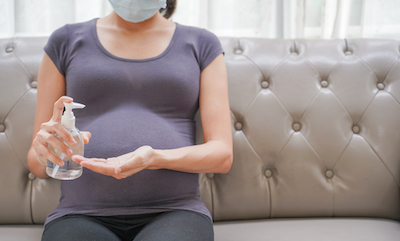Pregnancy Planning during a Pandemic.
 The Boston Globe recently asked Lauren Wise if COVID-19 shutdowns and stay-at-home orders around the country this spring will lead to a modest baby boom this winter. It’s plausible, according to the professor of epidemiology and principal investigator of the School of Public Health-based Pregnancy Study Online (PRESTO).
The Boston Globe recently asked Lauren Wise if COVID-19 shutdowns and stay-at-home orders around the country this spring will lead to a modest baby boom this winter. It’s plausible, according to the professor of epidemiology and principal investigator of the School of Public Health-based Pregnancy Study Online (PRESTO).
But as the new coronavirus turns the world upside down, Wise and her PRESTO colleagues are wondering about more than a “baby boomlet.” Does having had COVID-19 make it harder to conceive? Does the stress of this difficult time raise the risk of miscarriage? Are couples postponing their plans until things settle down?
For the last decade, PRESTO has shed light on what does and doesn’t help or hinder conception and a healthy pregnancy, including soda, stress, cannabis use (by prospective mothers and fathers, respectively), and sleep.
Now, the researchers are turning their attention to the new coronavirus, and the havoc it has wreaked.
“This is an unprecedented situation that is dramatically affecting all aspects of people’s lives,” says Amelia Wesselink, PRESTO co-investigator and a postdoctoral associate in epidemiology. “Our access to an ongoing cohort of women trying to get pregnant and women who are pregnant will allow us to assess the reproductive consequences of this type of crisis.”
In PRESTO, thousands of women and couples planning to get pregnant across North America have responded to detailed online surveys every two months, answering questions about everything from intercourse frequency and menstruation, to smoking and diet, to education and income, as well as their experiences if and when they do get pregnant and give birth.
The next round of surveys will now also include questions about COVID-19, including whether a woman or her male partner has had COVID-19-like symptoms or tested positive, how worried she is about contracting the disease, how her life has been affected by workplace closures and other efforts to slow the spread of the disease, whether she is considering holding off on trying to get pregnant, and whether concerns about COVID-19 are affecting her prenatal care or birth plans.
“There is huge value in adding questions about health crises to an ongoing study like this,” Wesselink says, noting that PRESTO will be able to capture and compare data on stress levels before, during, and after this unprecedented pandemic.
“One of the key strengths of our internet-based study is the ability to adapt quickly as important potential new risk factors emerge,” says co-investigator Elizabeth Hatch, professor of epidemiology. “This seemed like an opportunity that we shouldn’t pass up.”
Comments & Discussion
Boston University moderates comments to facilitate an informed, substantive, civil conversation. Abusive, profane, self-promotional, misleading, incoherent or off-topic comments will be rejected. Moderators are staffed during regular business hours (EST) and can only accept comments written in English. Statistics or facts must include a citation or a link to the citation.